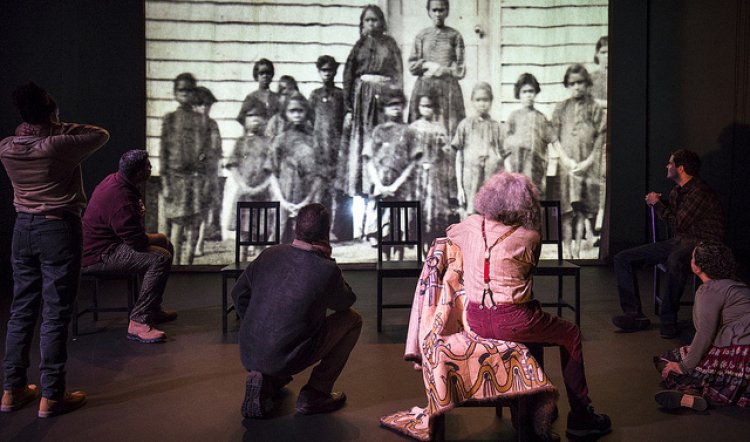
CORANDERRK
CORANDERRK, Ilbijerri Theatre Company and Belvoir, supported by the Balnaves Foundation, at Upstairs Belvoir, December 7, 2013-January 3, 2014. Photography by Patrick Boland: the cast and contemporary Coranderrk; right: Jack Charles.
The true story of Coranderrk is an extraordinary one. The "Aboriginal Reserve", established in 1863 north-east of Melbourne, was home to the Kulin peoples, previously displaced from their ancestral lands by steadily encroaching white settlement.
A white manager, lay preacher John Green (Bjorn Stewart), helped them establish a farm community that, through hard work and good soil, became self sufficient and extremely successful. Other displaced Aborigines were invited to join the community and until 1877, it was one of the rare good news stories of the white colony.
But in 1877, pressure from white farmers - envious of the land - caused the Aboriginal Protection Board to start the process of displacing the people once again. John Green was forced to leave and a campaign of letters and petitions got underway. The community's elders led by William Barak (Jack Charles in a sumptuous possum fur cloak) walked to the city (according to Google maps: 12 hours and 55 minutes, probably longer then without proper roads or street lighting) in deputations to the state parliament.
The outcome was not good, of course, and the Coranderrk cemetery - near Healesville - remains a place of pilgrimage and remembrance to this day. It is also a place of bittersweet triumph because, despite the efforts of authorities - overt and covert - the Coranderrk Aborigines were not wiped out and many thousands can proudly trace their ancestry to those pioneering farmers.
More than that, because of the conscientious nature of the colonial clerical class, there is a treasury of documentation - letters, ledgers, the petitions, the parliamentary records and so on - left from which to draw material and inspiration for a play script. This was done originally by Andrea James and Giordano Nanni in a verison titled, Coranderrk: We Will Show The Country, staged at the Sydney Opera House in 2012.
Now reworked to foreground the Coranderrk people (rather than John Green and his arch opponent, the Reverend Strickland) it also features an all-Aboriginal cast, playing the white men as well as the black characters. As well as Charles and Stewart they are Kate Beckett, Mathew Cooper, Kelton Pell and Melodie Reynolds-Diarra. And it is no longer entirely a verbatim work, according to the writers, "we have…taken dramatic license to imagine ourselves between the lines to give greater value to the traditions of Aboriginal oral history and culture."
Unfortunately, the one thing James and Nanni have not done is take dramatic license and the clue to this can be found in their Writers' Notes. "As co-writers our academic and cultural approaches have sometimes clashed, but we have always honoured the spirit of Aboriginal and non-Aboriginal collaboration to respect and give voice to the extraordinary people who are connected to Coranderrk."
There is nothing more likely to kill a theatre work stone dead than an "academic and cultural approach" unless it's one that seeks to "honour and respect" or one that's written virtually by committee with everyone's views being given equal weight. Enthralling dramatic entertainment can be made from truth, honour and respect was evidenced in Scott Rankin's marvellous Namatjira.

Somewhere between Namatjira and Coranderrk lies I Am Eora (Sydney Festival 2012) which also featured Jack Charles and a substantial cast of performers. Publicly, people were extremely positive about I Am Eora - co-written and directed by the currently controversial Wesley Enoch - privately the views expressed were mixed at best and otherwise mainly negative. My own review (in the archive on this site) was more positive than was entirely honest and, in retrospect, I believe the mechanics of the Theatre of Guilt and Oppression were at work.
This thing, the Theatre of Guilt and Oppression, came into being with the burgeoning of feminist and women's theatre in the late 70s-80s. At that time it was deemed politically incorrect, unsupportive, anti-women, anti-feminist and downright hostile and unacceptable to be anything but entirely encouraging and positive about feminist and women's work. That is, the proponents of the genre employed guilt - at the previous invisibility and disparagement of women's work - as the way to oppress and suppress any form of critical opinion. So, no matter how amateurish, embarrassing and dull it happened to be (and often was) being critical or analytical was perilous and severely discouraged. The result was that awful, boring, self-righteous tosh was treated with reverence and hallelujahs and meant there was no critical space between rubbish and, say, the work of Caryl Churchill. It put back women's playwrighting by decades and is still a ball and chain around the ankles of women writers. The same can be said of contemporary Australian Aboriginal theatre.
Coranderrk is dull, poorly constructed and wastes both its performers and the story it seeks to tell. The writers appear to have identified the shortcomings of the previous incarnation as something to do with the verbatim format. They could do well to take a look at David Williamson's "verbatim community conferencing" trilogy - Face to Face, Conversation and Charitable Intent - to see how well it can work, when handled by a skilled dramatist.
Essentially, Coranderrk falls into the basic trap of telling rather than showing and compresses the most thrilling and terrible part of the story into a throw-away monologue of a few minutes at the very end. It's a terrible pity that Coranderrk - the place and people - fell into these well meaning hands as it probably means no one else will be able to have a go in the foreseeable future.
The rest of the creative team is excellent: set and costumes by Ruby Langton-Batty and Ralph Myers, lighting by Damien Cooper, composer and sound designer: Ben Grant and audio-visuals of contemporary photographs by Peter Worland. Their work is not enough to make up for a numbingly dreary and depressing 60 minutes that should have been thrilling in the extreme. The opening night audience whooped and applauded and many expressed horror and amazement: this is depressing in itself. It's way past time for that men and women of Australia; I'd bet you know more about Nelson Mandela and care more about him than about the black people of this country, past and present.
One final observation: it's tokenism and insulting to have a "welcome to country" on opening night for a black show. Every show or not at all.



